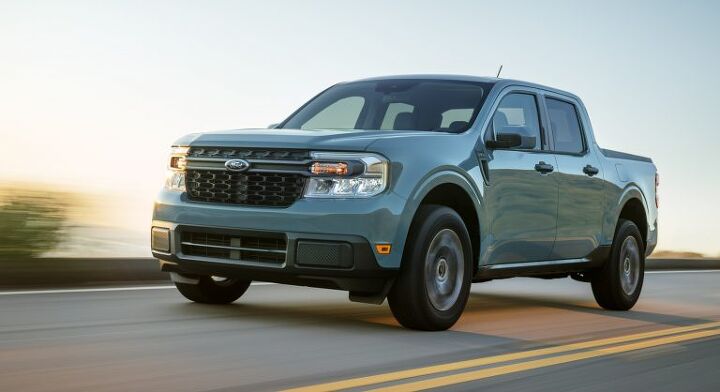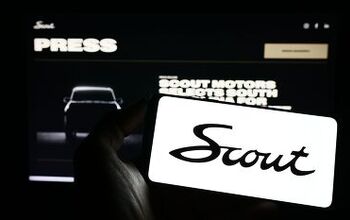Blue's Clues: Ford Introduces Money-Back Used Car Program

The used car market may be red hot, but Ford seems to be intent on pouring a bunch of blue all over the place. Starting next month, certain second-hand vehicles hawked by Ford stores will qualify for a 14-day/1,000-mile money-back guarantee.
Or perhaps some dealers are feeling the heat from places like Carvana. That’s up for debate.
It’ll be called Ford Blue Advantage. Ford will partner with Autotrader and tested the system last summer in about a dozen dealerships dotted around the country. The company said there are about 25,000 vehicles on the site right now, with a quick sort-n-search showing the oldest to be a 2012 Tundra CrewMax with 76K on the clock. Pricing ranges from $7,900 for a decade-old Chevy Sonic to $120,000 for a Shelby GT500 located in California.
To muddy the waters, all Blue Advantage vehicles include additional warranty coverage backed by Ford, masquerading under two different banners. Gold Certified vehicles pass a 172-point inspection and come with a 12-month/12,000-mile comprehensive warranty and seven-year/100,000-mile powertrain. Dealers can certify Ford vehicles at the Gold level for up to six years and at less than 80,000 miles.
Meanwhile, Blue Certified vehicles – those 10 years or newer, with 120,000 miles or less – pass a 139-point inspection and come with 90-day/4,000-mile comprehensive coverage. This level allows dealers to certify both Ford and non-Ford vehicles up to 10 years old with less than 120,000 miles. Roadside assistance is part of the deal on both Gold and Blue.
Of course, these types of return programs come with all sorts of caveats for the buyer – not the least of which are mileage and damage restrictions. A dealer who is rolling out Blue Advantage on Tuesday told this author the option to get one’s trade-in back will not exist, and any negative equity on that side of the deal will need to be repaid.
Also in the fine-print is a notation the return will not be accepted if the vehicle has a “lien or other encumbrance”. Now, we assume this means a lien other than the loan agreed upon when Joe Customer purchased the Blue Advantage vehicle. Otherwise, this program would only apply to cash deals. While car companies perpetually make mystifying decisions, that type of ‘gotcha’ situation would surely be a PR nightmare for this program. Does Ford take the risk and hang on to that paper for 14 days before officially filing it with a lender? Or does that phrase simply refer to mechanic’s liens and the like? Let’s hope it’s the latter.
What do you think? Ford says Blue Advantage is a way to draw more interest and showroom (or website) traffic. Do such programs affect your car-buying decisions? Sound off in the comments.
[Image: Ford]

Matthew buys, sells, fixes, & races cars. As a human index of auto & auction knowledge, he is fond of making money and offering loud opinions.
More by Matthew Guy
Latest Car Reviews
Read moreLatest Product Reviews
Read moreRecent Comments
- Mike Bradley Autonomous cars were developed in Silicon Valley. For new products there, the standard business plan is to put a barely-functioning product on the market right away and wait for the early-adopter customers to find the flaws. That's exactly what's happened. Detroit's plan is pretty much the opposite, but Detroit isn't developing this product. That's why dealers, for instance, haven't been trained in the cars.
- Dartman https://apnews.com/article/artificial-intelligence-fighter-jets-air-force-6a1100c96a73ca9b7f41cbd6a2753fdaAutonomous/Ai is here now. The question is implementation and acceptance.
- FreedMike If Dodge were smart - and I don't think they are - they'd spend their money refreshing and reworking the Durango (which I think is entering model year 3,221), versus going down the same "stuff 'em full of motor and give 'em cool new paint options" path. That's the approach they used with the Charger and Challenger, and both those models are dead. The Durango is still a strong product in a strong market; why not keep it fresher?
- Bill Wade I was driving a new Subaru a few weeks ago on I-10 near Tucson and it suddenly decided to slam on the brakes from a tumbleweed blowing across the highway. I just about had a heart attack while it nearly threw my mom through the windshield and dumped our grocery bags all over the place. It seems like a bad idea to me, the tech isn't ready.
- FreedMike I don't get the business case for these plug-in hybrid Jeep off roaders. They're a LOT more expensive (almost fourteen grand for the four-door Wrangler) and still get lousy MPG. They're certainly quick, but the last thing the Wrangler - one of the most obtuse-handling vehicles you can buy - needs is MOOOAAAARRRR POWER. In my neck of the woods, where off-road vehicles are big, the only 4Xe models I see of the wrangler wear fleet (rental) plates. What's the point? Wrangler sales have taken a massive plunge the last few years - why doesn't Jeep focus on affordability and value versus tech that only a very small part of its' buyer base would appreciate?


































Comments
Join the conversation
This is interesting to me because the biggest problem with third party warranties is the companies selling them are typically selling snake oil who prey on subprime. If Ford could change this they have the potential to change the entire remarketing industry, but the devil will be in the details. I would expect it to work a bit like Medicare, there will be a max amount paid for a service no matter if its a Ford or a Bentley, and the owner is expected to make up the difference.
So... its a post sale inspection with the right of full return? The big box shops should already be doing this, I fail to see how this is a viable product. The only thing I can think of is Ford could sell the inspection to smaller indys for a fee (who do not do any kind of formal inspection unless they pay for pre sale or post sale on the block) so the consumer can see someone signed off on it and I suppose return it if its a lemon.